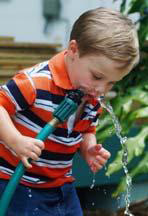Water Quality

Water pollution is usually caused by human activities. Pesticide and herbicide run-off from agricultural or personal use and illegal dumping of chemicals, oils, and waste can contaminate the water. Developed areas have a higher proportion of impervious surfaces (asphalt, concrete) that prevent the rainwater from seeping into the ground. As the volume of stormwater run-off increases, so does the amount of pollutants that are carried away.
Florida's high rainfall contributes to contamination as water runs off the land surface (a process known as stormwater run-off) and excess contaminants (pesticides, fertilizers, oils, greases) are picked up and carried away. This water percolates into the soil, bringing the contamination with it.
Percolation is the downward flow or movement of water through soil before it reaches the water table and becomes groundwater. Some contaminants are filtered by the soil. However, underground water in Florida is especially vulnerable to contamination because of its well-drained soils (such as sand) that do not filter out all of the contaminants.
-
How You Can Help
Reduce pesticide and fertilizer use
Over-applying yard chemicals results in them washing away with rain and sprinkler use. Eventually, because of the path of stormwater run-off, these chemicals end up in natural lands and wetlands. If pesticides must be used, be sure to follow the application directions on the labels and protect children and pets from exposure. Here are10 tips to protect children from pesticide and lead poisoning.Let only rain down the street drain.storm drain
Anything that goes down a stormwater drain (stormwater runoff) is usually not treated at a wastewater plant before being discharged into local ponds, rivers, streams, and lakes. So be sure to keep oil, household chemicals, and yard waste out of the drain.In some communities, stormwater is directed to retention and/or detention ponds for treatment. Retention ponds are characterized by a continual pool of water that mixes incoming stormwater with previously collected water. Discharge is through seepage into soil and evaporation.
Detention ponds serve as excess water catchments that dry up between storms. During periods of heavy rains, water can be directed through human-made wetland areas for filtration and delay the water's entry into natural bodies of water.
Pick up after your pets
This will reduce bacterial and nutrient pollution in groundwater.Clean up spills and leaks
Instead of hosing it down, spread cat litter over an oil spill (or other chemical substance), sweep it up, and dispose of it in the garbage. Dispose of leftover unwanted chemicals (including used batteries of all sizes) or used containers (such as paint cans) at your local landfill drop-off site. Contact your city or county government to find out where to drop off hazardous household materials.



